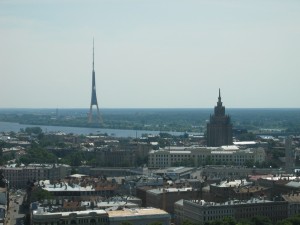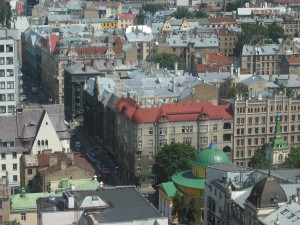What are the incentives to take part in science-society dialogue? Does my research have any impact? How could I efficiently interact with stakeholders and citizens? These were some of the questions that we (Mikko Rask and Maria Pietilä from the University of Helsinki) used in order to spur early career scientists’ imagination and to entice them to attend a workshop on public engagement in research in Riga, Latvia.
PE2020 had the pleasure of organizing this futures workshop on public engagement as part of the 10th Baltic Sea Science Congress the 16th of June, 2015. The workshop was organized in collaboration with BONUS, the European Union’s joint Baltic Sea research and development programme. BONUS is one of the research contexts for PE2020 in piloting innovative public engagement processes related to the societal challenges identified in Horizon 2020, the EU Framework Programme for Research and Innovation.
Altogether eleven early career scientists working on Baltic Sea research took part in the workshop on the 16th of June. They worked in six different countries (Denmark, Finland, Germany, the Great Britain, Lithuania, Sweden), majority being employed in one of the BONUS projects. In the workshop, we discussed the activities and experiences the scientists had so far had in public engagement, identified needs for more training, and devised a practical plan for future public engagement training and hands-on activities that could be piloted in the near future.
Our rationale for focusing on early career scientists is this group’s potential impact on agenda-setting and new modes of work. Academic environment is often hierarchical: PhD students, for example, tend to depend on the ideas and support of their senior colleagues. Our motive for the workshop was to give a voice to the junior-level scientists as they may (and often do) have fresh ideas and enthusiasm to test new science and society interaction methods, such as new interactive online tools.
The scientists’ experiences of public engagement have so far been very positive. Many were active in blogging about their research (see: http://www.bonusprojects.org/bonusprojects/blogs), many had already taken part in communicating with stakeholders and some communicated their research through social media. Some challenges were also observed. These include learning to use a language that the wider societal groups can understand, and communicating with citizens and stakeholders when the researcher is located in a foreign culture and does not master the national languages.
Universities’ PhD programs do not always include training in science communication, let alone training in more advanced methods and approaches of public engagement. Following from this lack of training, the workshop participants identified a need for more training of general science communication. Extending ideas of traditional science communication, we also discussed possibilities for trying out innovative public engagement procedures. For instance, the examples of citizen science and Soapbox Science raised a lot of interest.
We wish to thank the BONUS secretariat, especially communication manager Maija Sirola, executive director Kaisa Kononen and trainee Pankaj Pant, for their support and genuine enthusiasm to support the BONUS ‘young scientists’ in public engagement and other transferable skills. We have not come across with other European research programmes which would have such an extensive focus on early career scientists.
Last but not least, we would like to thank the workshop attendees for their active participation, open-minded attitude towards experimenting with new public engagement ideas and for being welcoming towards science-society interaction. We also welcome all early career scientists working in BONUS-related projects (also those who did not participate in the workshop) to give your input on your training needs and interests in particular types of public engagement methods you would like to experiment with (please contact: maria.pietila(at)helsinki.fi, mikko.rask(at)helsinki.fi, or timo.aarrevaara(at)helsinki.fi). For inspiration, please have a look at the inventory of different public engagement mechanisms and initiatives prepared by PE2020: Report D1.1.
All comments and feedback are welcome, because based on the workshop discussion, we agreed that we will organize a one-day public engagement training in the autumn 2015 in collaboration with BONUS. The day could be organized in a physical location and streamed to all BONUS early career scientists interested in such training.
-Maria-

